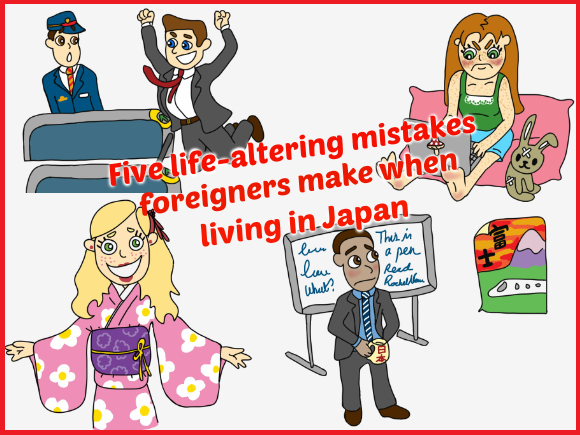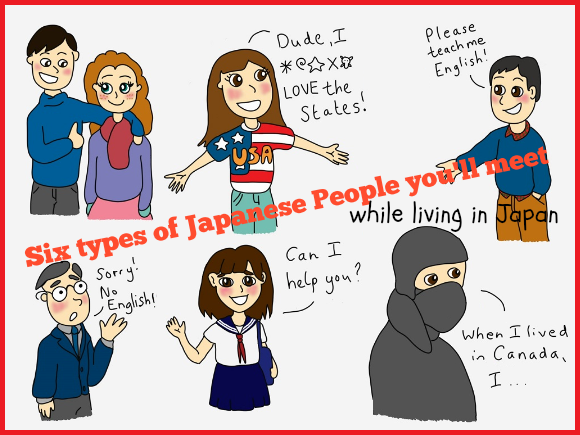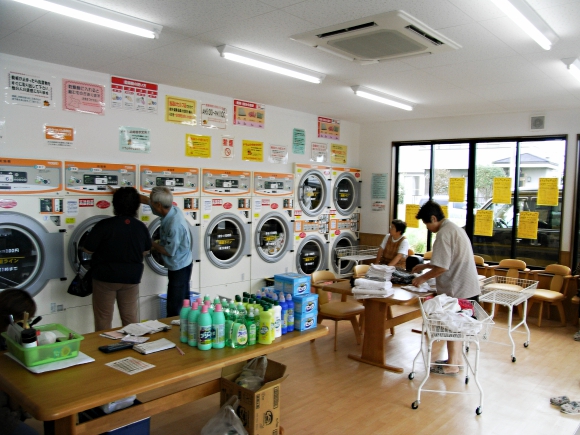The tiny shaded part of each map represents half of the population.
Living in Japan (Page 5)
You can learn all the words and practice all the kanji, but there’s one little Japanese language quirk that will almost certainly trip you up when you first encounter it.
Beyond silly mistakes like wearing toilet slippers on tatami or forgetting to add “san” to someone’s name, what other things do foreigners unknowingly do to reduce their chances of living happily in Japan?
A while back, we had some fun talking about five of the more noteworthy types of foreigners you’ll meet in Japan, based upon observations drawn from our time spent working and living here in the Land of the Rising Sun. Whether you’re a Plastic Sensei, Hateimus Japanicus, Secret Ninja, Bubble Dweller or Kid in a Candy Store (or indeed, all of these at different times), we reckon there’s probably quite a lot foreign residents can find to nod their heads at when considering each of those five extreme types.
But what about the flip side of the coin? Spend enough time as a foreigner in a country like Japan—a place that’s 98.5% ethnically Japanese—and you’ll be sure to notice that Japanese people will approach you, the foreigner, in a number of different ways. Today we’d like to share our thoughts on six kinds of Japanese people foreigners might meet during their time in Japan. See how many of them you’ve come across during your time traveling or living in the country!
Moving to Japan from another country can be a bit of a culture shock. Some handle the transition without any problems, and others can find it initially overwhelming. But it’s easy to forget that Japan isn’t one giant monolith, and the various prefectures can be wildly different—so much so that moving to a new prefecture can bring plenty of surprises even for those born and raised in Japan!
A great example is one of our own RocketNew24 Japan writers, Masami, who shares some of the things that surprised her after moving to Nara. Here are nine that may resonate with you!
If you’re used to using a dryer when you do laundry in your home country, you might be in for a surprise if you ever move to Japan. Despite the country’s numerous technological advancements to make your life easier, clothes dryers here pale in comparison to many overseas models, and they aren’t something you’ll find in your average Japanese household. Instead, most Japanese people prefer to hang their washing outside to air dry.
Sure it’s a more affordable and ecological way of doing things, but what do you do when the rainy and typhoon seasons make drying clothes outside impossible or you have too much laundry to hang outside all at once? It’s time for a trip to the laundromat, or what Japanese like to call a koin randorii (coin laundry). In fact, they’re becoming so popular that over the past 10 years the number of coin laundries across Japan has almost doubled, despite little growth in the laundromat industry world-wide.
But why is the coin laundry business suddenly booming? We decided to find out!
Japan attracts all kinds of people from all over the world. Some come to work, others come to play, and thanks to its relatively low crime levels, high standard of living and abundance of delicious food, Japan is a very easy place to call home for a while. Plus, isn’t Japan where all those anime, video games and ninjas come from? It’s got to be worth a visit!
But today, instead of talking about the myriad things Japan has to offer visitors, we’re going to have a bit of fun by taking a closer look at some of the visitors themselves. You might not encounter each of these five types of people if you’re staying in Japan for just a couple of weeks, but if you’re here for work or an extended sojourn, then you’re bound to meet at least a couple of them along the way…
I come before you today, readers of RocketNews24, with a confession. What I am about to tell you may shock you, but it’s eating away at me and I need to get it off my chest. You see, yesterday afternoon on my way to lunch, I did a fellow foreigner–a fellow gaijin, if you will–a tremendous injustice. It was not my intent to do so, but at the very moment this gentlemen, this benevolent stranger, put himself out there and sought to make a minor connection with another foreigner, I turned away.
That’s right, gentle reader, I accidentally ignored a Gaijin Nod.
Allow me to explain.
Ten years ago, I used to read a lot of books. Now, I read a lot of content, which is to say, blogs and online articles. But when I read something that sticks with me, even for a fleeting moment, I still want to reach for a highlighter and shade the words fluorescent yellow, so I can find that part again later. And I’m not alone in my instinctive response to treat the digital word in the same way I do printed material. There’s a reason browsers still call it a “bookmark” when we save a webpage.
There are all kinds of great English-language blogs about Japan out there. But there are also a number of stand-alone articles that, over the years, I’ve read again and again – and they still make me want to grab my highlighter and start collecting quotes. I’ve put them together into this short list, which we may think of as a small (highly subjective) foreigners-living-in-Japan canon: seminal pieces of writing from around the internet.
Some of these are very long. Some are controversial. All of them have stayed with me for some reason or another, and maybe they’ll stick with you too.
It doesn’t matter where you are in the world, if you’re an expat, there’s something from home you’re craving. Whether it’s chips and salsa or a good, strong beer, not having easy access to your favorite foods can put a damper on even the most enthusiastic of world travelers. That’s why knowing what to bring back after a visit home is so important, and Sharla, a university student living in Tokyo who makes videos about life in Japan, is here to help. Take a look at her video titled “What to Pack for JAPAN 日本に持っていくべき物!” and be prepared to take some notes. As an added bonus, Sharla speaks in English but includes subtitles in Japanese so anyone studying either language can get some extra practice.
Read More
It should come as no surprise to our readers to hear that we’re big fans of Japan. Pretty much everything here works as it should, the food is amazing, the culture rich, and people are on the whole likeable and friendly. But there are times when Westerners, and Japanese who have spent any amount of time abroad for that matter, realise that Japan gets some things not just wrong but horribly wrong.
So join us after the jump as we redress the balance no doubt offset by our constant admiration of Japan by discussing the 10 little things that drive us nuts in this otherwise great country.
When you hear the word, “Japan,” what comes to mind? Mt. Fuji? Animé? Cherry blossoms? Those of us who have lived in Japan came to this country with ideas of what we might encounter and many of those preconceived impressions turned out to be completely false. We asked foreigners who have been living in Japan for at least three years to share what they thought about Japan before ever stepping foot inside the country. Take a look at their answers:
You, Me, And a Tanuki is a weekly featured blog run by Michelle, a Californian who is currently one of only two foreigners living in Chibu, a tiny fishing village on one of the Oki islands in Japan. Check back every Saturday for a new post or read more on her website here!
From my experience, there is very little privacy in Japan compared to the US. You want to take some time off during the summer break to go on a vacation? You better write down where you’re going and for how long so that information can be distributed to not only your boss, but everyone in the office. Make a big mistake at work? You’re purposely going to get scolded about it in front of your coworkers. A close family member passed away? You’re going to have to make a public announcement about it whether you want to or not (at least that’s what I was forced to do at work when my grandmother passed away and I had to suddenly go back to America).
The oddest invasion of privacy that I have ever encountered here in Japan is always during the yearly health examinations. Since I’m a public worker, once a year I am required to have a full physical. This sounds awesome, I get a free health check-up and I don’t even need to make an appointment.
Wrong, it is awful.
You, Me, And a Tanuki is a weekly featured blog run by Michelle, a Californian who is currently one of only two foreigners living in Chibu, a tiny fishing village on one of the Oki islands in Japan. Check back every Saturday for a new post or read more on her website here!
My husband and I live on a five square mile island with less than 600 inhabitants. To make matters even cozier, most of our island is mountainous so the houses are clustered together on the coasts where any flat land is available. As a result of our close proximity to our neighbors and the fact that we are the only two foreigners on the island, everyone knows where we live.
This is a great thing most of the time. People often come to our door to give us extra vegetables from their garden or fish they caught. When Khoa and I stayed on the island during New Year’s, the principal of the elementary school saw the light on at our house, figured we were home, and invited us over for a big New Year’s feast.
However, there is a downside to the entire island knowing our whereabouts.













 Foreigner’s request for help in Tokyo makes us sad for the state of society
Foreigner’s request for help in Tokyo makes us sad for the state of society Japan’s summertime towelket pillowcases are even better with the addition of Ghibli stars【Photos】
Japan’s summertime towelket pillowcases are even better with the addition of Ghibli stars【Photos】 Should you add tartar sauce to Japanese curry rice? CoCo Ichi makes diners an unusual offer
Should you add tartar sauce to Japanese curry rice? CoCo Ichi makes diners an unusual offer Seaside scenery, history, and so many desserts on Yokohama’s Akai Kutsu【Japan Loop Buses】
Seaside scenery, history, and so many desserts on Yokohama’s Akai Kutsu【Japan Loop Buses】 Japanese city loses residents’ personal data, which was on paper being transported on a windy day
Japanese city loses residents’ personal data, which was on paper being transported on a windy day Suntory x Super Mario collaboration creates a clever way to transform into Mario【Videos】
Suntory x Super Mario collaboration creates a clever way to transform into Mario【Videos】 10 crazy pizzas from Japan
10 crazy pizzas from Japan Japan’s massive matcha parfait weighs 6 kilos, contains hidden surprises for anyone who eats it
Japan’s massive matcha parfait weighs 6 kilos, contains hidden surprises for anyone who eats it Energy Milk from Japan is the new way to power up your day
Energy Milk from Japan is the new way to power up your day The 10 best anime of the fall season, according to Japanese otaku
The 10 best anime of the fall season, according to Japanese otaku McDonald’s new Happy Meals offer up cute and practical Sanrio lifestyle goods
McDonald’s new Happy Meals offer up cute and practical Sanrio lifestyle goods Japanese ramen restaurants under pressure from new yen banknotes
Japanese ramen restaurants under pressure from new yen banknotes French Fries Bread in Tokyo’s Shibuya becomes a hit on social media
French Fries Bread in Tokyo’s Shibuya becomes a hit on social media Studio Ghibli releases new action figures featuring Nausicaä of the Valley of the Wind characters
Studio Ghibli releases new action figures featuring Nausicaä of the Valley of the Wind characters Red light district sushi restaurant in Tokyo shows us just how wrong we were about it
Red light district sushi restaurant in Tokyo shows us just how wrong we were about it New private rooms on Tokaido Shinkansen change the way we travel from Tokyo to Kyoto
New private rooms on Tokaido Shinkansen change the way we travel from Tokyo to Kyoto Tokyo Tsukiji fish market site to be redeveloped with 50,000-seat stadium, hotel, shopping center
Tokyo Tsukiji fish market site to be redeveloped with 50,000-seat stadium, hotel, shopping center Beautiful Ghibli sealing wax kits let you create accessories and elegant letter decorations【Pics】
Beautiful Ghibli sealing wax kits let you create accessories and elegant letter decorations【Pics】 Studio Ghibli releases Kiki’s Delivery Service chocolate cake pouches in Japan
Studio Ghibli releases Kiki’s Delivery Service chocolate cake pouches in Japan New definition of “Japanese whiskey” goes into effect to prevent fakes from fooling overseas buyers
New definition of “Japanese whiskey” goes into effect to prevent fakes from fooling overseas buyers Our Japanese reporter visits Costco in the U.S., finds super American and very Japanese things
Our Japanese reporter visits Costco in the U.S., finds super American and very Japanese things All-you-can-drink Starbucks and amazing views part of Tokyo’s new 170 meter-high sky lounge
All-you-can-drink Starbucks and amazing views part of Tokyo’s new 170 meter-high sky lounge More foreign tourists than ever before in history visited Japan last month
More foreign tourists than ever before in history visited Japan last month New Pokémon cakes let you eat your way through Pikachu and all the Eevee evolutions
New Pokémon cakes let you eat your way through Pikachu and all the Eevee evolutions Disney princesses get official manga makeovers for Manga Princess Cafe opening in Tokyo
Disney princesses get official manga makeovers for Manga Princess Cafe opening in Tokyo Sales of Japan’s most convenient train ticket/shopping payment cards suspended indefinitely
Sales of Japan’s most convenient train ticket/shopping payment cards suspended indefinitely Sold-out Studio Ghibli desktop humidifiers are back so Totoro can help you through the dry season
Sold-out Studio Ghibli desktop humidifiers are back so Totoro can help you through the dry season Japanese government to make first change to romanization spelling rules since the 1950s
Japanese government to make first change to romanization spelling rules since the 1950s Ghibli founders Toshio Suzuki and Hayao Miyazaki contribute to Japanese whisky Totoro label design
Ghibli founders Toshio Suzuki and Hayao Miyazaki contribute to Japanese whisky Totoro label design Doraemon found buried at sea as scene from 1993 anime becomes real life【Photos】
Doraemon found buried at sea as scene from 1993 anime becomes real life【Photos】 Tokyo’s most famous Starbucks is closed
Tokyo’s most famous Starbucks is closed One Piece characters’ nationalities revealed, but fans have mixed opinions
One Piece characters’ nationalities revealed, but fans have mixed opinions We asked a Uniqlo employee what four things we should buy and their suggestions didn’t disappoint
We asked a Uniqlo employee what four things we should buy and their suggestions didn’t disappoint Princesses, fruits, and blacksmiths: Study reveals the 30 most unusual family names in Japan
Princesses, fruits, and blacksmiths: Study reveals the 30 most unusual family names in Japan Suntory x Super Mario collaboration creates a clever way to transform into Mario【Videos】
Suntory x Super Mario collaboration creates a clever way to transform into Mario【Videos】 10 crazy pizzas from Japan
10 crazy pizzas from Japan Japan’s massive matcha parfait weighs 6 kilos, contains hidden surprises for anyone who eats it
Japan’s massive matcha parfait weighs 6 kilos, contains hidden surprises for anyone who eats it Energy Milk from Japan is the new way to power up your day
Energy Milk from Japan is the new way to power up your day The 10 best anime of the fall season, according to Japanese otaku
The 10 best anime of the fall season, according to Japanese otaku Video claims that if you can read a certain font, you are probably not Japanese【Video】
Video claims that if you can read a certain font, you are probably not Japanese【Video】 Father and son dissect a gachapon capsule toy machine to show us its magical insides【Video】
Father and son dissect a gachapon capsule toy machine to show us its magical insides【Video】 French Fries Bread in Tokyo’s Shibuya becomes a hit on social media
French Fries Bread in Tokyo’s Shibuya becomes a hit on social media Here are Japan’s most-sung karaoke songs in 2022 from karaoke system Joysound
Here are Japan’s most-sung karaoke songs in 2022 from karaoke system Joysound Alcohol Made with Fermented Wasps Gives New Meaning to the Phrase “Get Your Buzz On”
Alcohol Made with Fermented Wasps Gives New Meaning to the Phrase “Get Your Buzz On” Ghibli Park now selling “Grilled Frogs” from food cart in Valley of Witches
Ghibli Park now selling “Grilled Frogs” from food cart in Valley of Witches Unmistakable Louis Vuitton Monogram design may have been inspired by Japanese family crests
Unmistakable Louis Vuitton Monogram design may have been inspired by Japanese family crests Mt. Koya planning to instate visitor’s tax to cope with huge tourist numbers
Mt. Koya planning to instate visitor’s tax to cope with huge tourist numbers